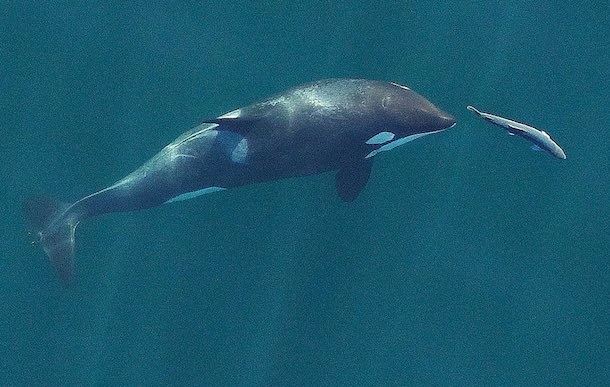forum
library
tutorial
contact

Inslee Voices Support for Short-term Action
on Orcas as Long-term Decisions Loom
by Simone del Rosario
Q13 FOX, July 30, 2018
|
the film forum library tutorial contact |

|
Inslee Voices Support for Short-term Action
by Simone del Rosario
|
"We need to reduce the mortality of Chinook smolts as they move down the river," Governor Inslee said.
 SEATTLE -- Gov. Jay Inslee said Thursday that quick and dramatic action needs to be undertaken to save southern resident killer whales in the Pacific Northwest, but stopped short of saying he was committed to breaching four dams on the lower Snake River.
SEATTLE -- Gov. Jay Inslee said Thursday that quick and dramatic action needs to be undertaken to save southern resident killer whales in the Pacific Northwest, but stopped short of saying he was committed to breaching four dams on the lower Snake River.
In an interview with Q13 News' Simone Del Rosario, Inslee said short-term efforts to save the orcas are already underway, even as a newly appointed task force works to address the primary threats the whales face: Prey, vessels and contaminants.
"We're acting now to improve the production of Chinook, which is critical to their survival, and to take some short-term measures to reduce the interference with their hunting from noise," Inslee said. "And some other measures that will reduce the other species ultimately that are preying on the Chinook themselves."
Since being listed as endangered in 2005, the southern resident orca population has gone down 15 percent. The steps that have been taken so far, including increased salmon hatcheries, voluntary no-go zones and habitat restoration, have not resulted in more whales.
Inslee said some of his efforts to bolster the orca population have run into resistance in the state legislature.
"I wish the legislature had followed my proposal to them sooner," Inslee said. "A year and a half or two years ago I proposed to help the orcas by reducing toxicity. I've made proposals that would spend dollars to improve our habitat that have not yet been adopted by the legislature. I'm glad the legislature is now showing a little more support for this effort, and I'm hopeful they will when we get this task force recovery plan."
Inslee said a workable orca action plan will require sacrifice from people across the state. Some experts have suggested increased "no-go zones," which apply to all recreational boats -- fishing or otherwise -- as well as commercial vessels, in an effort to minimize disruption to orcas' fishing.
"It's a position I've had for some time, that we should follow science and have an appropriate level of protection of these orcas," Inslee said. "That's why right now we're reassessing to see what the distance should be. I believe it's going to have to be greater to provide the orcas a greater level of protection, and that's what we're going to know when we get this task force done.
"This is some interference potentially with some of the tourism involved in this, but this is my point. If we are going to save the orcas, all of us are going to have to in some way pitch in to help. That's Eastern Washington - we need additional flows down the Columbia River, that's why I've supported additional spill, so we can move more smolts down the river faster so that there's more food available to the orcas."
Perhaps the most beneficial -- and the most difficult -- action available is to breach four dams in the lower Snake River.
According to Bonneville Power Administration, the Columbia River basin produces more hydropower than any other river system in North America.
But according to orca researcher Ken Balcomb, it also used to produce a lot more Chinook.
"The biggest watershed was in the Columbia and Snake River basin," he said. "That was 12 million fish, that was a huge amount of fish. Damming those rivers up and preventing access to their spawning grounds was the coup de grace for Chinook salmon."
Inslee said he wouldn't shy from that fight if necessary, but said it's ultimately the federal government's decision.
"We should consider the science, and that is a decision that is being considered," he said. "Under the federal court decision it is mandated, so that is now being considered. So I believe we should look at the science of that proposal to determine what its benefits could be to the orca, and what other alternatives could be to the Snake River dams.
Inslee said more immediate action is needed in the meantime.
"We need to reduce the mortality of Chinook smolts as they move down the river," he said.
Inslee said ultimately it's up to the public to show their support for the orcas by voting for lawmakers at the state and federal level who are behind the effort.
"You've got a President right now who's working to reduce what we can do to help these endangered species," he said.
learn more on topics covered in the film
see the video
read the script
learn the songs
discussion forum
